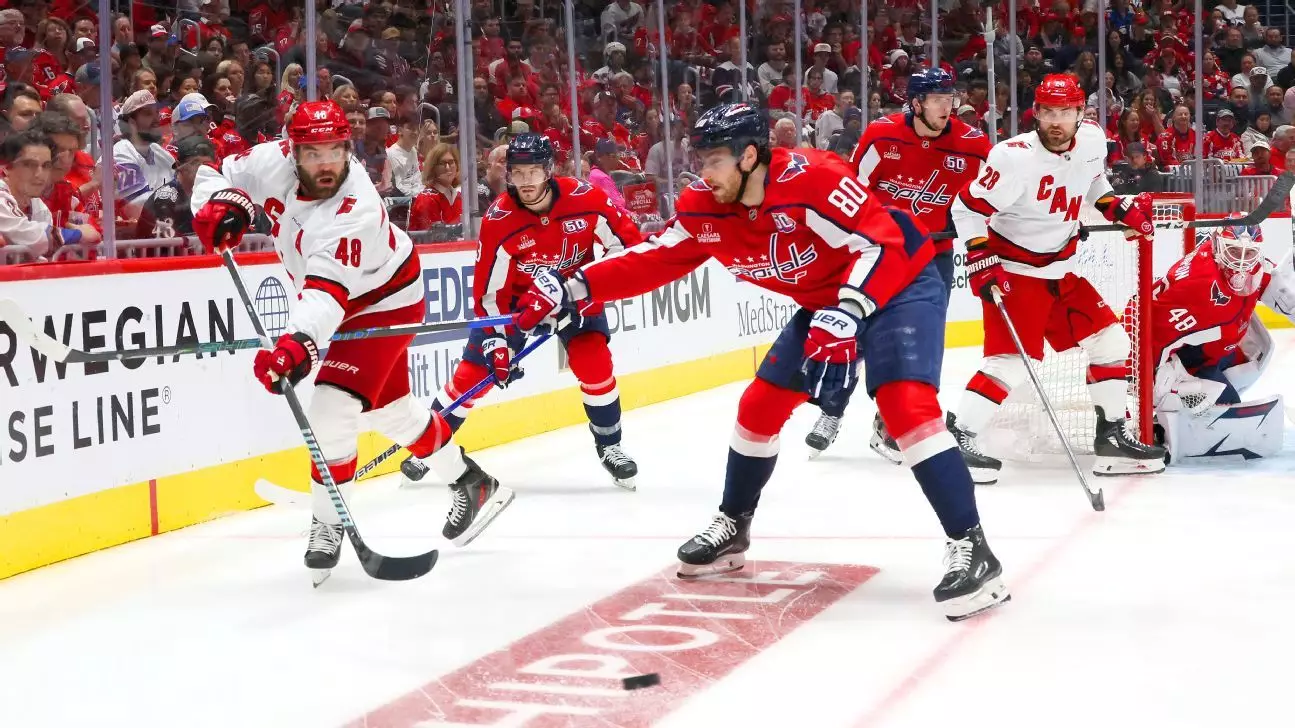In the electrifying world of the NHL playoffs, few moments are as thrilling as the climactic battle on the ice. The Carolina Hurricanes faced off against the Washington Capitals in an elimination game that can only be described as a pressure cooker filled with both tension and high-stakes drama. The Hurricanes emerged victorious with a resounding 3-1 win—an outcome that not only showcased their skill but also their resilience under duress. With their backs against the wall, the Hurricanes demonstrated a level of composure and unity that, while admirable, raises questions about whether such intensity is sustainable in the long run.
The game’s initial stage revealed a relentless Washington team determined to keep their season alive, deploying a barrage of shots and attempts to rattle the Hurricanes. Yet, despite the avalanche of pressure, it was Jordan Staal who struck first, igniting hopes and rallying the team’s spirits. This wasn’t just a goal; it was a lightning bolt that exemplified the understandings forged through previous playoff battles. With that critical first score hanging over the ice, Carolina channeled the fearlessness derived from their playoff history, cooked together with a genuine belief in their game plan.
A New Wave of Confidence
It was Andrei Svechnikov’s last-minute strike that ultimately sealed the fate of the game, adding another layer to an already rich narrative of struggle and determination. Svechnikov, who remains one of the leading lights for Carolina, effortlessly found a way to capitalize on a defensive lapse, scoring from an unfavorable angle. This goal, with merely 1:59 seconds left on the clock, served as a stark reminder of the razor-thin margins that define playoff hockey. However, reliance on late-game heroics can pose a double-edged sword. While rewarding in the short term, does it encourage an over-reliance on individual brilliance rather than a cohesive team effort?
Goalkeeper Frederik Andersen’s performance further underscored the importance of individual excellence within the collective. Stopping 18 of 19 shots, Andersen played with the assurance of a seasoned warrior. Yet, crediting one player solely with the victory obscures the energy of the entire team. It’s crucial to remember that while Andersen stood tall in the net, the defensive corps also executed a masterclass in discipline against star players like Alex Ovechkin—a feat that should not be taken lightly.
A Clash of Giants
The Hurricanes’ victory over the Capitals is especially significant, marking the first time since 1997 that an NHL team has eliminated a squad led by the all-time leading goal scorer. To frame this achievement as merely another win is to diminish the weight of its historical implications. This performance has ramifications that extend beyond this series; it suggests a paradigm shift in the playoffs and leaves us pondering the future of both franchises.
Despite coach Spencer Carbery’s sentiments about liking the Washington team’s efforts, emotions can’t mask the bitter sting of elimination. The Capitals’ exit, punctuated by Beauvillier’s lone unassisted goal, creates ripples of uncertainty. Will they learn from this loss and come back stronger, or will they succumb to prolonged periods of underachievement? As center-wing liberalism advocates for progress through evolution rather than revolution, Washington’s approach in the offseason will be telling. Will they adapt their game strategy to better suit the evolving landscape of the NHL, or will they cling to old habits with outdated thinking?
What Lies Ahead for the Hurricanes
As the Carolina Hurricanes gear up for their next playoff challenge, the ominous shadows of their previous conference finals loom large. Once again, they prepare to face rival teams like the Florida Panthers or the Toronto Maple Leafs, both of whom possess the skills and strategies to throw the Hurricanes off course. The upcoming matchup is anticipated to be fierce, challenging the Hurricanes’ resolve and testing their mettle. Each game will be a test of not just physical prowess but also of psychological endurance.
For the Hurricanes, the question remains—can they maintain their winning mindset against potent opponents? While their recent triumph reflects a team in harmonious unity, the quest for sustained success is fraught with challenges. The playoffs have a way of revealing weaknesses, and the pressure cooker will only become hotter as they advance deeper into the competition. The joy of victory can quickly turn into the agony of defeat, a crucial lesson that every athlete must learn.

Leave a Reply